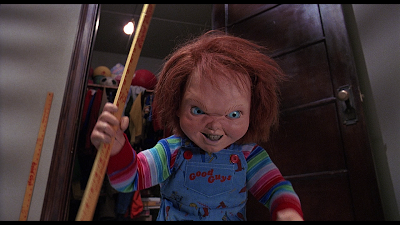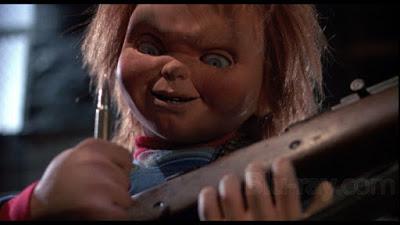Format: DVD from Cortland Public Library on rockin’ flatscreen.

When people talk about great horror properties, eventually, they’ll get to the Child’s Play series. There are at least seven films in the series, which gives it some considerable staying power, especially considering that the series has existed for more than thirty years and the seventh film was released in 2017. The first Child’s Play is a true classic. True to the way most horror series work, Child’s Play 2 came out a couple of years after the first film and picks up pretty much directly after the first film, give or take a few months.
Actually, it is a few months along. Our hero from the first film, young Andy Barclay (Alex Vincent) is now in the foster care system because his mother is under psychiatric care for backing up Andy’s story about a killer doll. As the film starts, Andy is placed in the Simpson home with parents Joanne (Jenny Agutter) and Phil (Gerrit Graham). The Simpsons have evidently taken a number of kids over the years, and are currently fostering Kyle (Christine Elise), who is just about old enough to be out of the foster care system for good.
So how does Chucky (voice by Brad Dourif) figure in to all of this? Well, the little plastic body of the evil doll from the first film has been recovered by the company that makes the toys. Sine there has been nothing but bad press concerning the “Good Guy murders,” their goal is to take the original doll accused by the Barclays of murderous intent and refurbish it completely. So, of course this means that Chucky is still around. In fact, one of the technicians attempting to fix the doll is electrocuted in the process.
So, Chucky is back and he more or less hijacks a toy company official to figure out where Andy is now. See, the spirit inside the doll, that of serial killer Charles Lee Ray, is desperate to get out. His only way to do so is to complete the voodoo ritual with Andy so that his soul can be transferred into Andy’s body. Chucky shows up and replaces the Good Guy doll the Simpsons already owned and then starts causing mayhem, all of which is initially blamed on Andy’s overactive imagination and psychological problems.
Child’s Play 2 has a decent body count, although several of the kills are so clearly telegraphed that they’re almost disappointing. One, near the end, is a factory worker who is killed in exactly the way that you predict he will be once you see a particular piece of factory machinery and are aware of is presence.
Overall, there’s a great deal here that works pretty well. The reaction of the Simpsons to the various problems created by Andy are completely understandable. Phil is standoffish and unwilling to put up with a lot from Andy while Joanne eventually feels sorry for him and wants to help him. The character of Kyle is perhaps a little less believable in this respect. Where Andy does nothing but cause problems for her initially, she immediately warms to him anyway. This is naturally possible, of course, but seems unlikely given Kyle’s history of being constantly moved around. In truth, based on that, psychologically she’s a lot more likely to identify with Chucky.
Anyway, Child’s Play 2 is decent up to the end. For some reason they end up at the factory where Chucky was rebuilt. Evidently this is because they need to be there for Chucky to transfer his soul into Andy. Kyle shows up as well and hilarity ensues. The problem here is the factory itself. This is a fully functioning factory that is evidently running 24/7 with no one on the shop floor. The only other person in the factory is some sort of night watchman/handyman who fixes the line when it breaks down, which seems to happen frequently.
I get why we ended up in the factory, honestly. It’s because it allows for some interesting set pieces and some fun things to happen to Chucky on the assembly line. But it doesn’t make any sense—it’s like a parody of “they’re taking all of our jobs” in the background of a horror movie, a weird bit of social commentary that doesn’t work.
Despite this, Child’s Play 2 is a decent sequel. It’s not as good as the first movie, but it does pretty well at maintaining the mythology as well as can be expected.

Sadly, this is absolutely not true of Child’s Play 3, which is loaded with problems from the jump. For one thing, this sequel was created in 1991, a year after the first sequel, but takes place a good 8-10 years after the first two films. Andy Barclay (Justin Whalin) is now a teen and, for whatever reason, has been sent to a military academy. There’s no clear reason that Andy has been sent to a military academy other than “he hasn’t fit in.” Note that this didn’t seem to work for Kyle in the previous movie despite the fact that she never fit in, either.
Anyway, Andy shows up at the military school where he, of course, doesn’t fit in. This is in large part because no one bothers to tell Andy what he needs to do. He’s evidently supposed to simply know how to do everything and he continually gets in trouble for not knowing how to handle his weapon or march. He also frequently does things like walk away from formations, sometimes without anyone seeming to notice. This is despite the fact that at least some of the punishments he wants away from were directly caused by him and he would be the focus of them.
Anyway, of course Chucky is going to be rebuilt. In this case, the factory where the Good Guy dolls were made is put back in service. And, because no one ever learns anything, evidently the melted plastic scrapings are reused. Since these have also been infused with Chucky’s blood (since he spent so long in the body of the doll, he started to become human), he is reincarnated in the body of the first doll off the line. I’m not sure why he wasn’t reincarnated in all of the dolls, but Child’s Play 3 is not a movie that cares a great deal about logic.
Chucky naturally tracks down where Andy has gone and he mails himself to the military school. He’s not that interested in transferring into Andy’s body anymore; he’s looking for revenge. He’s going to be blocked in that initially when a young cadet named Tyler (Jeremy Sylvers) discovers the contents of the package and decides to keep Chucky for himself. This is where the completely stupid logic of this movie starts to go off the rails. Andy has been shipped a package. The guy in charge of the mail gives it to Tyler to deliver. Tyler doesn’t, and evidently can’t figure out that it might be a problem in a military academy if he steals someone else’s gift. Tyler then, in a military academy decides to play in restricted areas with a large doll, where he is frequently seen by other people. Apparently, Tyler either never gets punished for anything or no one gives a shit about him.
Anyway, this is the sort of logic that pervades the film. One cadet named De Silva (Perrey Reeves) decides that she wants to know more about Andy, so she—dressed in civilian clothing in a military academy—breaks into the office of the guy in charge to hunt through the records. And, because everyone in this movie is an idiot, she locates Tyler and Chucky in a closet in the commandant’s office. It’s like the military academy is run by the Keystone Kops.
Eventually, Chucky causes mayhem during the school’s wargames by loading one team’s rifles with live rounds. He does this as the students are being told to collect their guns. He does this one gun at a time, and one bullet at a time. To make matters worse, he leaves all of the paint rounds (which are normal bullets, but paint—like they wouldn’t seriously wound or kill someone when fired from a rifle) on the ground. So, apparently no one in the entire school noticed that the probably deadly paint rounds were all over the floor. No one check their ammunition. And it took multiple hours for people to go collect their weaponry after being ordered to do so.
The problem with Child’s Play 3 is that a particular set of events was desired here, and rather than finding logical ways to get to those events or coming up with different ones, these events were cobbled into a script regardless of whether or not they made sense. And they don’t. And because of this, the movie essentially fails.
How badly? Well, Child’s Play came out in 1988, and by 1991, we had Child’s Play 3. The sting from this one was bad enough that we didn’t get the fourth film until 1998.
Why to watch Child’s Play 2: It’s a solid continuation of the mythology created in the first film.
Why not to watch: It has less of a build than the first film, so it feels less substantial
Why to watch Child’s Play 3: Well, you’ve come this far in the series.
Why not to watch: It fails on almost every level.
